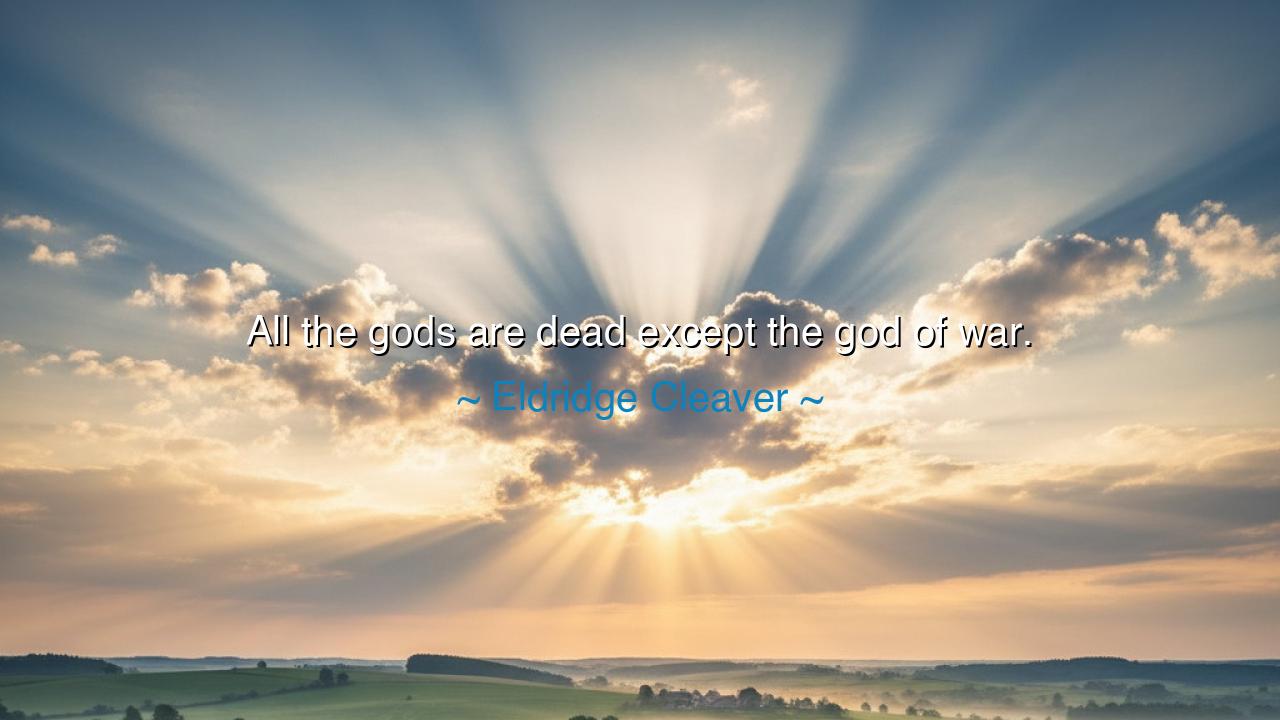
All the gods are dead except the god of war.






The revolutionary voice Eldridge Cleaver, a man forged in the storms of the twentieth century, once proclaimed with stark intensity: “All the gods are dead except the god of war.” In this utterance, he cast his gaze upon the modern age and saw that the idols once worshiped—whether of faith, tradition, or morality—had been toppled, yet the altar of violence remained. His words are both lament and prophecy: lament for the loss of higher ideals, prophecy that war, ancient and terrible, continues to rule humanity even when all other gods have fallen.
The origin of this thought lies in Cleaver’s experience as an activist, writer, and member of the Black Panther Party during the 1960s. He lived in an age when empires crumbled, revolutions erupted, and the United States itself was torn by racial conflict, war in Vietnam, and unrest at home. To him, it seemed that justice, mercy, and the gods of peace were silenced, while the machinery of violence—armies, weapons, and police batons—ruled as the only power that men truly obeyed. Thus he declared that the god of war was the last deity left standing.
History confirms the bitter truth in his words. Consider the First World War, when the supposedly enlightened nations of Europe—boasting of science, philosophy, and progress—descended into barbarity. The gods of reason and culture perished in the trenches of Verdun and the Somme, but the god of war thrived, feasting on millions of lives. Or recall the Cold War, when nuclear weapons, capable of annihilating the earth itself, were raised like idols above humanity. In such times, it seemed that art, faith, and morality bent their knees to the dominion of violence.
Cleaver’s saying is not only historical but eternal, for mankind has often betrayed its nobler ideals. The gods of compassion and justice demand sacrifice, patience, and humility—qualities difficult for nations intoxicated with power. But the god of war promises quick glory, immediate dominance, and the satisfaction of fear and vengeance. This is why he endures while others are forgotten: because men, when pressed, too often find comfort in destruction rather than discipline in peace.
Yet even in his harshness, Cleaver’s words hold a hidden challenge. If only the god of war remains, then it is upon us to resurrect the other gods—to breathe life once more into the ideals of mercy, justice, and peace. For war may be eternal in its temptation, but it is not invincible. Gandhi’s movement in India, through nonviolence, struck down an empire without a shot. Martin Luther King Jr., through love and protest, shattered legal segregation in America. These victories prove that the god of war need not reign forever, if people are bold enough to follow other powers.
For us who hear this teaching, the lesson is clear: beware of a world where every struggle is answered with violence. In our own lives, too, when conflict arises, the easiest response is anger, force, or retaliation—the god of war whispering in our ear. But to choose peace, dialogue, and patience is to defy that god, to honor the others long neglected. The work is harder, the path longer, but the fruit endures.
Therefore, let this wisdom endure: though Cleaver warned that all the gods were dead save the god of war, it is not destiny but a challenge. The god of war thrives because men feed him with fear and hate. Let us starve him by reviving the gods of justice, mercy, and truth. In nations and in hearts, let us resist the seduction of violence and strive for the harder, holier work of peace. For only then shall the pantheon of humanity be restored, and the god of war be dethroned at last.






TTran
Cleaver’s statement seems to suggest that war has become a powerful and unyielding force in our world, overtaking other ideals and values. While war certainly has a long history, I wonder if this quote oversimplifies the complexity of human belief systems. Are we truly living in a world where the ‘god of war’ reigns, or is there still room for hope, compassion, and the principles that have historically stood for peace and unity?
THtrang ho
Cleaver’s words strike me as a reminder of how deeply embedded war is in human history. The idea that all gods are dead except the god of war seems to imply that violence and conflict are the ultimate powers in the world. But is this really the case? Do we place too much emphasis on the importance of war, or can we still fight for peace and reclaim some of those lost gods?
QABui Quynh Anh
This quote from Cleaver feels quite powerful, but it also leaves me questioning what he means by ‘the gods.’ Does he mean that people have lost faith in ideals like love, justice, or morality, and have instead placed their trust in the destructive force of war? If so, does that mean society has become numb to the horrors of conflict, or is there still hope for the revival of these ‘gods’ of peace and unity?
TTLe Thi Tham
Cleaver’s quote seems to reflect a cynical view of humanity, suggesting that while traditional values or moral beliefs may have faded, war remains a constant driving force. Is it true that as society evolves, the glorification of conflict has become the dominant ‘god’ in our lives? Could this be a commentary on how power and violence often overshadow more peaceful pursuits, or is it an exaggerated perspective on humanity’s darker tendencies?